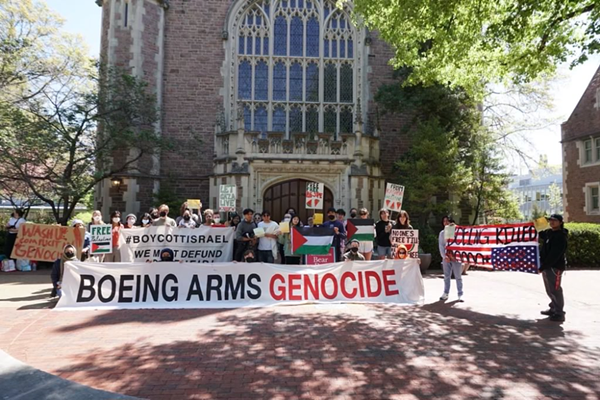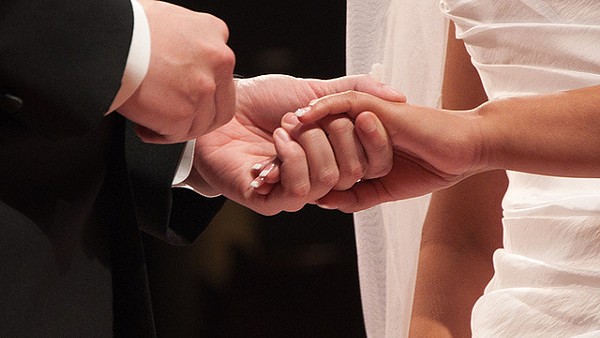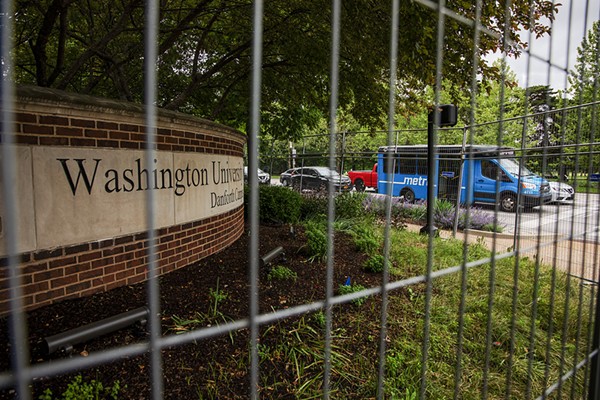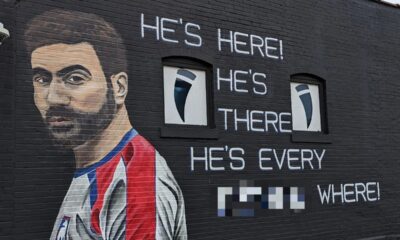Local News
Student Protests Have Wash U in the Hot Seat Over Its Ties to Boeing

On April 13, activists blended in with a crowd of nearly 500 parents and prospective Washington University students as they entered Graham Chapel for Admitted Students Day. Partway through the event, they made their move.
Three students unfurled a banner, while 17 others marched to the stage while chanting for a free Palestine. Less than 30 minutes later armed police stormed in with zip ties.
Activists were given three warnings to disperse. Then the arrests began. Twelve people were arrested. Three students were suspended.
Nearly two weeks later, two Wash U students sit around a kitchen table in University City to talk about genocide.
The table is covered in political science and abolitionist texts and both students’ phones alert them consistently throughout the conversation. They have already spent a busy morning fielding texts from other organizers working to pressure the school to divest from Boeing and the work to organize future protests is in constant motion.
It is evident during the conversation that the protests are highly organized — with designated de-escalators, designated observers and photographers, and a clear distinction between who could risk arrest and who must be protected at all costs.
Daniel Cazares, a senior studying business and computer science, is one of three students who was suspended, and one of 12 activists slapped with court summons, for protesting inside the chapel.
He and Sonal Churiwal, a sophomore studying women, gender, and sexuality studies and political science, are both involved with Resist Wash U, an activist organization calling on the university to divest from Boeing amid Israel’s brutal attacks on Palestine.
Cazares tells RFT activists disrupted the event for admitted students because it is one of the final times the school has the opportunity to sell itself to potential students. Demonstrators wanted to make it clear to the prospective students and their parents that the school has close ties with Boeing.
While some parents and prospective students attending the event were adamantly opposed to the protest, others — particularly families of color — were sympathetic or spoke with protesters to learn more. “A few families actually stay behind in the chapel for at least 30-40 minutes with us, either throwing peace signs or chanting with us,” Cazares says.This helped give protesters courage because as the chanting continued, armed police entered the chapel, he says.
Rather than being taken to jail, the arrested protesters were issued court summons. Cazares believes that’s because the administration didn’t want photos of students being escorted in public view in handcuffs. (It’s also worth noting that what they were cited with — disturbing the peace and trespassing, municipal ordinance violations for unincorporated St. Louis County — are often handled without people being booked into jail.)
Churiwal remained outside with other students, alumni and activists to hold the line until all arrested protesters were released. They remained there for about two and a half hours, she says.
The arrested activists must now appear in St. Louis County’s municipal court in Hazelwood on June 4.
Cazares also received an email later that day saying he was suspended and banned from campus until the disciplinary process plays out. He wasn’t surprised. In November he’d received a warning, one complete with vague surveillance footage that administrators claim showed him hanging up Pro-Palestine posters on campus. Luckily Cazares was taking the semester off from classes and the suspension won’t impact his graduation date, he says.
One week later, on April 20, Churiwal says she was part of a group that organized a rally on campus. This time, it was the university’s alumni weekend.
Alumni, including a graduate student at Columbia who had been arrested at an encampment there, helped set up a Pro-Palestine encampment on the campus.
“We were making banners and we had food, and within minutes, the Washington University Police Department came over and they had a megaphone and they declared the encampment unlawful, gave us five minutes to leave, and said if we don’t leave, we’re gonna be arrested for trespassing,” Churiwal says.
Multiple departments responded — including the Wash U campus police, the St. Louis Metropolitan Police Department, Richmond Heights Police and Clayton Police — surrounding the encampment with over half a dozen squad cars. At this point the police outnumbered students and alumni.
“To our knowledge we were not breaking any university policy,” Churiwal says.
After some back and forth with protesters, activists were told they were violating the campus’ space utilization policy. Churiwal says they asked what part of the policy was being violated but received no response.
“We were forced to leave and students were walked off campus if we didn’t leave,” she says. “It was clearly an intimidation tactic. […] The university is definitely on edge and definitely wants to shut things down before it has a chance to escalate.”
Wash U students are among the ranks of university students across the U.S. protesting the ongoing onslaught of Gaza and calling on their respective administrations to divest from companies like Boeing.
Wash U’s involvement with Boeing includes an accelerated leadership program, funding for scholarships and tuition discounts for Boeing employees. Boeing is one of the largest employers of Wash U graduates, she says.
In addition to taking direct action, Churiwal worked with Wash U’s student union to formally demand the university divest from Boeing and end those programs.
“Admin hasn’t even felt it necessary to communicate with us on it,” she says. “So if the institution is frustrated by direct action responses, we have also gone through the proper channels for advocacy, and receive absolutely no response.”
Faculty and staff have also expressed disappointment in the university’s attempts to suppress student protests and published a letter on Friday demanding the administration stop calling in armed police and reverse the student suspensions.
RFT asked Wash U by email whether police would be called to future protests, what the university’s response was to claims that these demonstrations have been treated differently than others in the past, and what comment the university had in response to calls to divest from Boeing.
Assistant Vice Chancellor for News & Media Relations Susan Killenberg McGinn emailed the following response: “We fully support free expression and will allow demonstrations that follow our policies. Our policy on Demonstrations and Disruptions is available here. Our policies apply to all demonstrations, regardless of the topic.”
While free speech issues on campus are receiving wide-spread media attention right now as police continue to arrest peaceful protestors from Columbia to the University of Texas, activists hope to keep the conversation centered around Palestine.
“St. Charles’ Boeing factory is the final stop where these planes, bombs, missiles go before getting shipped off to Israel,” Cazares says. “Not even the university but just by being in the city we are so tied to Boeing, and therefore also tied to the genocide that’s going on. So tied to these 40,000+ lives that have just been decimated and erased. It’s heartbreaking every day to be made complicit to that.”
Churiwal says one of the arguments student organizers have heard from the administration is that they shouldn’t be so concerned about Palestine because it is thousands of miles away.
“You all have PhDs, do you not see that the genocide is manifesting abroad but you are manufacturing it here?” she asks. “The genocide is happening in our backyard.”
Cazares adds that the protests have revealed the true attitudes of Wash U administrators.
“The real Wash U is a university that will not hesitate to send armed officers to physically police students, to put their hands on Black and brown student bodies,” he says.
Subscribe to Riverfront Times newsletters.Follow us: Apple News | Google News | NewsBreak | Reddit | Instagram | Facebook | Twitter | Or sign up for our RSS Feed
Local News
Missouri Lawmakers Still Cool with Child Marriage, Actually

While most 16-year-olds are thinking about homework or what to wear to prom, at least seven Missouri legislators remain convinced they should be allowed to sign marriage licenses and plan shotgun weddings.
Child marriage has been a longstanding embarrassment for the Show Me State. It wasn’t until 2018 that legislators got around to banning marriage for residents 14 years of age and younger — and even then, 50 lawmakers voted no.
Currently, teens as young as 16 can marry in Missouri with parental consent.
Earlier this year, Senator Holly Thompson Rehder (R-Bollinger), Senator Lauren Arthur (D-Kansas City) and Representative Chris Dinkins (R-Lesterville), introduced a bill that would ban marriage for anyone in the state under the age of 18. But with less than a week left in the legislative session, the ban is likely to die thanks to seven people.
These members of a key house committee are standing in the way of the ban, according to the Kansas City Star. Despite bipartisan support, these members of the majority Republican committee have chosen to stand against any reforms that would help prevent minors (especially teen mothers) from being forced into marriages.
The bill passed the Missouri Senate with overwhelming support (one person voted in opposition) and has been sent to the House Government Efficiency and Downsizing committee. Its sister bill is awaiting a vote in the House Judiciary Committee.
It is unclear who on the committee makes up this opposition. Committee Chairman Jim Murphy (R-St. Louis County) did not respond to our questions.
From 2000-2020 (some of the most recently available statistics on the topic) approximately 8,151 children were married in Missouri alone, according to Unchained At Last, a nonprofit dedicated to ending child marriages. The majority of these cases (78 percent) involved young girls being wed to adult men.
In a state like Missouri that has a complete abortion ban, teens who become pregnant are more at risk for being coerced into marriage. But hey! We apparently think that’s just fine in Missouri, and far be it from lawmakers to feel any haste in cracking down on it.
Subscribe to Riverfront Times newsletters.Follow us: Apple News | Google News | NewsBreak | Reddit | Instagram | Facebook | Twitter | Or sign up for our RSS Feed
Local News
Prepare to ‘Unzip Your Regalia’ at Commencement

There is a clear undertone of tension on the campus of Washington University as students finish finals and prepare for commencement, Sylvie Raymond, a senior who is graduating this coming Monday, tells RFT.
“I’m a little nervous to see how everything plays out and what measures the school takes,” Raymond says. “And obviously, there’s always the thought in the back of my mind, like, are they going to cancel graduation?”
Some schools that have seen student protests have canceled their main commencement or split it into smaller ceremonies, including Columbia University and the University of Southern California. Emory University moved its ceremony.
“The culture of fear and fear of getting suspended, doxxed, and just generally having repercussions for voicing your political beliefs is very palpable,” Raymond says. “And that is definitely troubling for a university that ostensibly should promote the free transmission and expression of ideas.”
After protests roiled the campus on April 27, Wash U moved swiftly to suspend the students involved and bar the faculty members from campus. At least one student swept up in the mass arrests told the Post-Dispatch her degree is being withheld while her case makes its way through the criminal justice system, though she will be allowed to attend commencement.
Wash U has also sent students additional guidance on what to expect for its commencement ceremony May 13. Now, among other precautions, graduates will be subject to inspections of their regalia.
In an email sent to people attending the university’s Law School Recognition Ceremony and subsequently shared with RFT, the university tells students, “Please be ready to unzip your regalia before and during the All-University Commencement and Law Recognition Line-ups.”
The university will also require tickets to attend the Arts & Sciences undergraduate ceremony this Sunday and the university-wide commencement on Monday, according to updated guidance on the university’s website. These tickets were sent directly to graduates to distribute. Chancellor Andrew Martin has begged students not to protest at the ceremony.
Wash U hasn’t responded to several emails from the RFT seeking further clarity on what the administration planned to check for at commencement, including whether graduating students would be allowed to wear keffiyehs. The traditional Palestinian headdresses have become a symbol of solidarity and resistance adopted by protestors as Israel’s attacks on Gaza continue. In response, people wearing them have been detained in France and Germany, and elsewhere targeted with violence, including the shooting in Vermont of two Palestinian students wearing them, according to Reuters.
The university has also fenced off the campus and, on May 6, added tarp around some of the fencing, supposedly “in order to ensure pedestrian safety and keep the area clear while crews are setting up a stage and other structures associated with the post-Commencement celebration.” University-issued IDs are now required to enter the Danforth campus.
Raymond says that at first she thought the fence was some kind of joke, but then she began to see it as a wall.
“It’s very troubling,” she says. “ I think it really flies in the face of this idea, or this notion that Wash U builds up about them being in St. Louis for St. Louis. I think this is very blatantly showing that that is not the case that this campus was never for the Greater St. Louis Community.”
In the days leading up to commencement, activists plan to have a standing protest at the corner of Lindell and Skinker in Forest Park just across from campus. These “Post-Up for Palestine” demonstrations will begin at 3:30 each afternoon and will include teach-ins and art builds, Resist Wash U has posted on social media.
Subscribe to Riverfront Times newsletters.Follow us: Apple News | Google News | NewsBreak | Reddit | Instagram | Facebook | Twitter | Or sign up for our RSS Feed
Local News
Tennessee Company Disses Citypark as ‘Most Unsafe’ MLS Stadium

A company most St. Louisans have likely never heard of — Bet Tennessee — has dissed the city’s St. Louis SC Stadium by ranking it the number one most unsafe Major League Soccer stadium in the country.
Just behind St. Louis in second and third place on the list are Houston Dynamo FC and the Portland Timbers.
The sports betting website claims it factored in “the crime rating, total crime index, fanbase ranking, and crime grade,” for the exact zip code of each stadium. Statistics around such a small space are bound to be flawed and can’t give a full picture of safety. Citypark is located in the same zip code as swaths of Downtown West and Union Station making it impossible to analyze crime in the stadium in a meaningful way based on zip code statistics alone.
Plus, what the fuck does Tennessee know about soccer safety?
Apparently — not much. And while St. Louis may be an easy target when it comes to cherry picking crime stats from narrowly tailored areas and zip codes — Tennessee SC has no room to talk.
Less than a year ago, police had their hands full at a Tennessee SC game in Nashville when officers had to detain 18 people for storming the pitch during a spontaneous stampede and leaving trash all over the field and injuring a security guard, USA Today reported at the time.
The state’s youth league sports are also much more dangerous than St. Louis, and earlier this year, a former Franklin soccer coach was indicted on 30 counts of sex-related charges after investigators say he targeted children who played on his team dating back to 2012, according to the Tennessean.
While St. Louis is far from perfect, at least remove the plank from your own eye before @ing us Bet Tennessee.
Subscribe to Riverfront Times newsletters.
Follow us: Apple News | Google News | NewsBreak | Reddit | Instagram | Facebook | Twitter | Or sign up for our RSS Feed
-

 Entertainment1 year ago
Entertainment1 year agoSt.Louis Man Sounds Just Like Whitley Hewsten, Plans on Performing At The Shayfitz Arena.
-

 Business1 year ago
Business1 year agoWe Live Here Auténtico! | The Hispanic Chamber | Community and Connection Central
-
Board Bills1 year ago
2022-2023 Board Bill 189 — Public Works and Improvement Program at the Airport
-

 Local News1 year ago
Local News1 year agoVIDEO: St. Louis Visitor Has Meltdown on TikTok Over Gunshots
-

 News1 year ago
News1 year agoTed Lasso-inspired pop-up bar now open in St. Louis
-

 Board Bills1 year ago
Board Bills1 year ago2022-2023 Board Bill 165 — Jefferson Arms Community Improvement District
-
Board Bills1 year ago
2022-2023 Board Bill 183 — Amending Ordinance Number 62885 known as the Capital Improvements Sales Tax
-

 News10 months ago
News10 months agoGas tanker crashes into St. Louis Metro transit center





